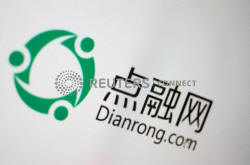China online lender Dianrong blames government for its
woes: memo
 Send a link to a friend
Send a link to a friend
 [March 18, 2019]
By Shu Zhang [March 18, 2019]
By Shu Zhang
SINGAPORE (Reuters) - Dianrong, one of
China's biggest peer-to-peer (P2P) lenders which is laying off staff and
shutting stores, blamed the government for its troubles saying the
absence of clear-cut policies was proving to be a heavy burden.
"Some people wonder why Dianrong's growth has slowed in the past two
years. It was not because we did not want to or could not grow. It was
because we were told not to grow," Guo Yuhang, Dianrong's co-founder,
said in an internal memo seen by Reuters.
"While the industry has expanded quickly to a large and complex scale
over the years, regulatory directions keep changing and different
regions have different rules," Guo said, in rare criticism of
policy-making in China.
Dianrong was shutting down 60 of its 90 offline stores and laying off an
estimated 2,000 employees, Reuters reported earlier this month.

The Shanghai-based company was co-founded by Soul Htite, who was also
behind U.S. online lender LendingClub Corp, and is backed by Singapore
sovereign fund GIC Pte Ltd and Standard Chartered Private Equity.
Beijing's multi-year crackdown on risky lending practices and excessive
leverage have caused a wave of P2P collapses and triggered protests by
angry investors who lost their savings.
"Grey rhino" risks, or highly obvious yet ignored threats, are on the
rise, including risks from internet finance such as P2P lenders, a
central bank official wrote in an official publication on Monday.
The industry could face a fresh wave of regulatory scrutiny after
several fintech companies were slammed by state-run CCTV during the
country's annual consumer rights day TV show on Friday.
Dianrong, which expanded rapidly in 2017-2018 in a loose regulatory
environment, had to cut back in the second half of last year, Guo said
in the memo.
[to top of second column] |

Illustration photo of the Dianrong logo on the company's website
April 13, 2017. REUTERS/Thomas White/Illustration

He added that many highly promising businesses Dianrong developed as part of its
aggressive expansion have turned into "heavy burdens with unbearable high costs"
for the company as regulations unexpectedly tightened.
The company's outstanding transaction volume has shrunk to 10 billion yuan
($1.49 billion) from its peak of 14 billion yuan, Guo said. Some employees were
not paid for two months, he said.
China's central bank has yet to respond to a faxed request seeking comment.
The central bank said earlier this month that it would gradually set up a system
of rules to regulate fintech and cultivate conditions conducive to the
development of the industry.
"We hope regulators can give the industry a clear, and definite timetable, and
give guidance and a ray of hope for companies that stick to compliance," Guo
said in the memo.
"The situation of the industry shows that the one-size-fits-all rule will
definitely curb innovative businesses."
Guo did not comment further when contacted by Reuters.
(Reporting by Shu Zhang; Writing by Samuel Shen and Ryan Woo; Editing by
Muralikumar Anantharaman)
[© 2019 Thomson Reuters. All rights
reserved.] Copyright 2019 Reuters. All rights reserved. This material may not be published,
broadcast, rewritten or redistributed.
Thompson Reuters is solely responsible for this content.
 |